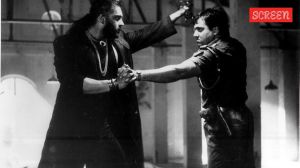India to push for liberalisation of US export controls
With Foreign Secretary Nirupama Rao scheduled to leave for a meeting of the India-US High Technology Cooperation Group on March 15 and 16 in Washington....
With Foreign Secretary Nirupama Rao scheduled to leave for a meeting of the India-US High Technology Cooperation Group on March 15 and 16 in Washington,New Delhi is gearing up to push for liberalisation of US export controls. India is already looking for easier access to cutting-edge US technology,especially in the defence and strategic sector.
South Block sources said Rao would lead the Indian delegation comprising representatives from different fields such as atomic energy,science technology,space technology,biotechnology and defence for the meeting which is being held after a gap of two years. The last meeting was held in New Delhi in February 2008. No meeting could take place in 2009 as US President Barack Obama had not made key appointments in the Bureau of Industry and Security (BIS).
Sources said US was giving a lot of importance to the meeting as Michael Froman,Deputy Assistant to the President and Deputy National Security Advisor for international economic affairs,was expected to be the keynote speaker at the meeting. Dennis F Hightower,Deputy Secretary in US Department of Commerce,was expected to lead the US team.
The meeting,sources said,would take place at a time when the Obama administration was going through a churning on the issue of export controls,with tremendous pressure being exerted on it from the industry. India was sensing an opportunity in this churning encouraged by the civilian nuclear cooperation agreement with the US which has got the NSG waiver.
In his State of the Union address,Obama had said his administration would embark on a new National Export Initiative that would make reform of the US export control system a top priority. He outlined that it would double US exports over the next five years.
While the White House formed an inter-agency working group in August last year to review existing US export controls,which govern sale of sensitive technologies overseas,Howard Berman,Chairman of the House Foreign Affairs Committee,said early this year he expected to introduce a bipartisan legislation later this year to overhaul export control regulations.
These developments have kindled hope in New Delhi,which has been clamouring for a change in what they call outdated US export laws,which reflect the mindset of the cold war era. With US being the largest exporter of high technology,New Delhi is keen to expand the scope of high-technology trade,which is mostly dominated by the aviation sector. In 2009,50 per cent of the high-technology trade between India and US was in aviation sector.
N-fuel reprocessing: Talks this week
NEW DELHI: With the one-year deadline fast approaching,India and the US have resumed negotiations on the reprocessing pact with a team from Washington expected here to hold talks this week on finalising the conditions under which New Delhi can re-use spent nuclear fuel generated by American-supplied reactors.
India is looking for a right to reprocess spent fuel depleted uranium to make it usable again in other reactors including the fast-breeder reactors. The reprocessing pact is the last remaining hurdle in the operationalisation of the landmark India-US civil nuclear cooperation agreement signed in 2007.
A team of US officials,led by Richard Stratford,Director of the Office of Nuclear Energy Affairs in the US State Department,is in New Delhi this week to finalise the arrangements and procedures under which spent fuel can be reprocessed by India. The Indian side is being led by R B Grover,the technical head in the Department of Atomic Energy.
Sources said with little time left for the July deadline,the coming round of talks were likely to be decisive. Most differences have been sorted out and very few sticking points remain. One of these pertain to the suspension of the right to reprocess in the event of India conducting a nuclear test.
ENS




- 01
- 02
- 03
- 04
- 05



























